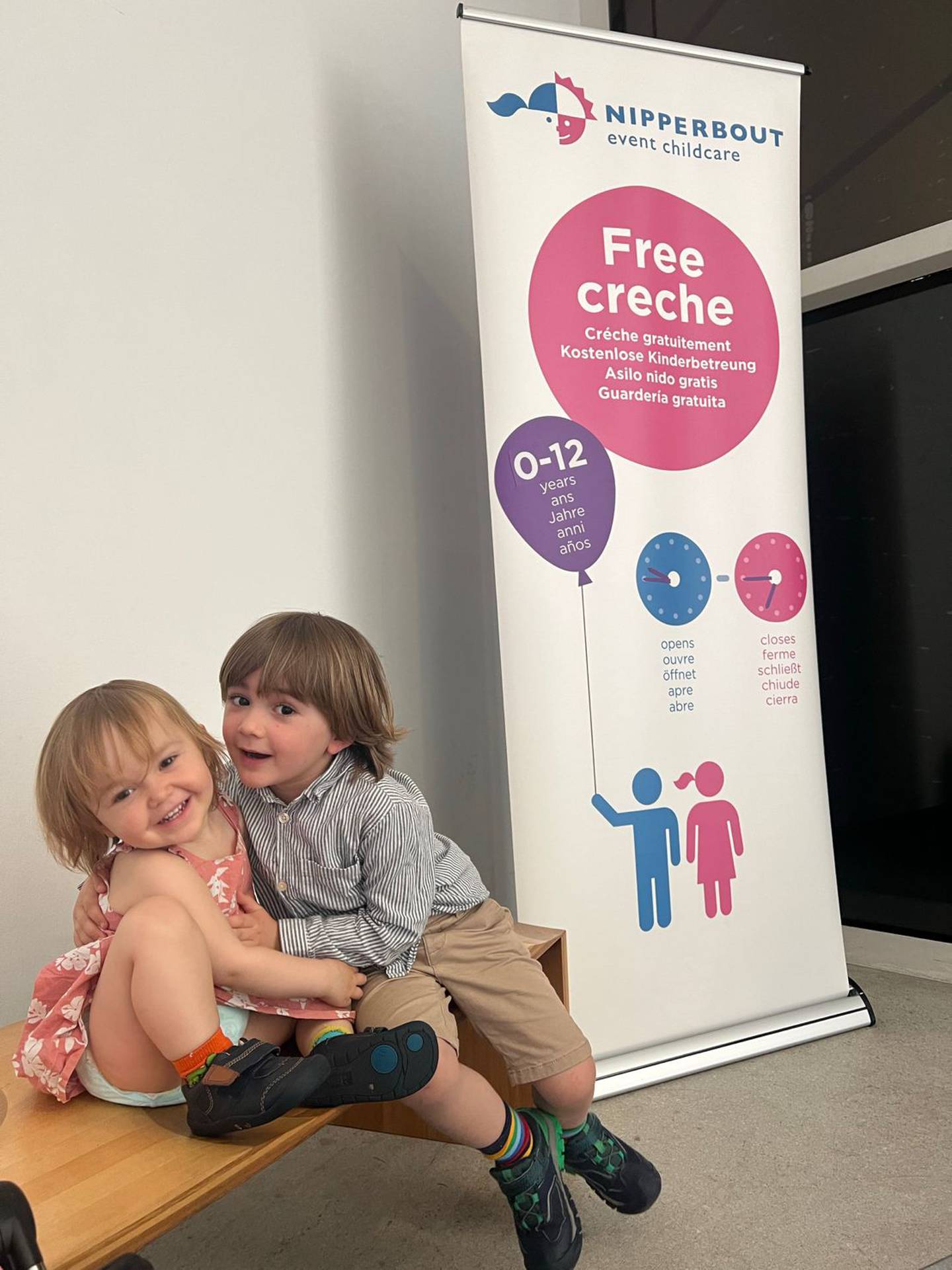
This week, the 3,500 attendees who converged on Shoptalk Europe in Barcelona may have noticed a new attraction nestled among the exhibitor booths and conference rooms: a nursery.
Organisers of Shoptalk Europe spent €25,000 ($27,400) to provide free childcare at the three-day retail trade show.
The uptake was “relatively small,” according to Shoptalk global president Sophie Wawro. But Wawro said it wasn’t about getting hundreds of attendees to clamour for the service in the first place.
“We’re just saying … we’re very happy for you to show up as a parent and to use this service if it’s helpful to you,” Wawro said. “It’s about having choices — you can decide what works for you.”
The balance between career and family has been at the centre of the corporate zeitgeist since women began entering the workforce in larger numbers in the 1960s. Each generation has put its own spin on what defines the ultimate work-life balance. In the last decade, many companies extended maternity leave benefits and included fathers and parents who adopt or have children via surrogacy. Some offer childcare subsidies and paid time-off for parents looking to volunteer at their children’s school or sports games.
The adoption of hybrid work arrangements during the pandemic introduced new challenges.
Parents can more often attend to their children and other domestic responsibilities when they’re working from home. But that can be an awkward fit with the “always on” culture that dominates many fashion workplaces. In some cases, it’s created an unrealistic perception of just how much flexibility parents actually have to juggle household and professional duties, experts say.
Women continue to bear the brunt of these struggles, research shows. Only 37 percent of women say they are able to switch off from work in 2023 compared to 45 percent in 2022, Deloitte’s 2023 Women at Work study found. (Deloitte’s study surveyed 5,000 women in 10 countries, including the US, Canada, India and China.) As is the case in the US, working women in Europe still perform most of the care duties for young children regardless of whether their partner is employed, a 2022 report from the European Institute for Gender Equality found.
In other words, work-life balance remains an elusive goal. That’s led some to advocate for redefining what a supportive workplace looks like. Policies like expanded family leave, work from home and on-site childcare are a big step. But companies should be striving to offer their employees “genuine flexibility,” Wawro said.
“It’s really about creating a spectrum of experiences — and letting people decide where on the spectrum feels right for them,” she said.

Defining Genuine Flexibility
The effectiveness of policies and perks depends on how they’re implemented.
The most effective leaders are able to apply “common sense” logic, avoiding a one-size-fits-all approach, said Kimberly Minor, chief executive officer of retail business consultancy Bumbershoot Group, and former Bandier president.
In a previous executive role at David’s Bridal in the 2000s, she unexpectedly found herself pregnant with her second child and realised her health care benefit package wouldn’t cover the pregnancy.
“I went to [the CEO] and I said, ‘I have a little situation. I wasn’t planning this. I’ve checked the wrong box … and the insurance I have won’t cover me,’” she said. “He goes, ‘yes it will … the policy will cover you because you’re valuable.’”
The CEO met with the company’s human resources department and had things tweaked to ensure Minor had the benefits she needed.
“Yes, policies are a helpful [foundation] but good leaders see the person [over] the policy and they figure it out,” she said.
Many working mothers have found support in being on teams with other women or having managers who, too, are parents. But companies shouldn’t assume that a manager will know how to manage parents just because they are one.
A CEO may not have the same perception of work-life balance as a store employee, or be fully conscious of the significant difference in resources each have available to them. Two working mothers at the same place in their careers can have entirely different at-home obligations and professional goals.
“Balance means different things to different people,” Minor said.
Training for all employees can help circumvent assumptions and biases on all sides, experts say. Retail store employees and other hourly employees should also be brought into these conversations, Minor noted.
Fundamental Policies
Even the most robust family benefits policies need support mechanisms to help parents perform at their physical, emotional and mental best.
Mental health stigmas in particular have proven tough to overcome. Companies can’t count on employees to speak up on their own or take advantage of resources if they aren’t convenient to access.
The number of women who feel comfortable disclosing mental health concerns to their employer has decreased in the past year from 43 percent to 25 percent — despite more than a third of women rating their mental health as poor or very poor, the Deloitte Women at Work study found.
Maybelline New York global brand president Trisha Ayyagari helped spearhead the introduction of the makeup brand’s mental health program, Brave Together, in 2020.
The program offers mental health resources, including crisis counselling, to people inside and outside of the company experiencing anxiety and depression. Last year, Ayyagari also introduced an on-site therapist for her team. The service, she said, has been consistently booked up.
“Having so much conversation around mental health has allowed people to have more open dialog about needing some time,” she said.
That openness has helped Ayyagari personally, too. She gave birth to her first child earlier this year, and the stress of her return to work last month was lessened simply because she could talk openly to other women on her team about her struggles, she said.
“Just to know that every mom is going through these things helps,” she said.
Through Maven, a virtual platform for women’s and family health that Maybelline parent L’Oréal offers as part of its health care benefits packages, Ayyagari found her son’s paediatrician, a lactation consultant as well as “return to work” tutorials to help prepare for the end of her maternity leave.
“You have to have flexibility and give people grace but it’s also about making sure you have physical resources in place,” she said.



